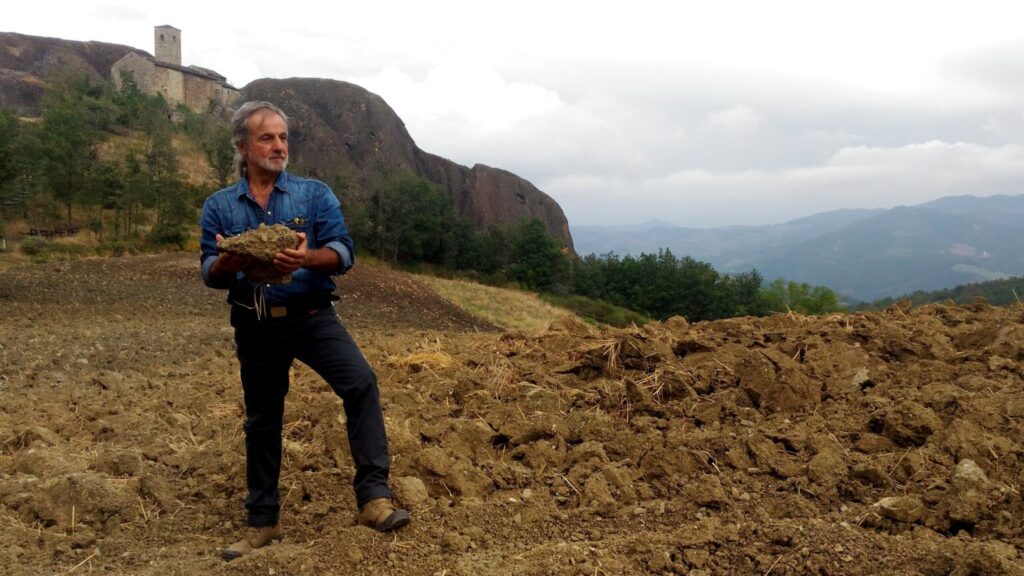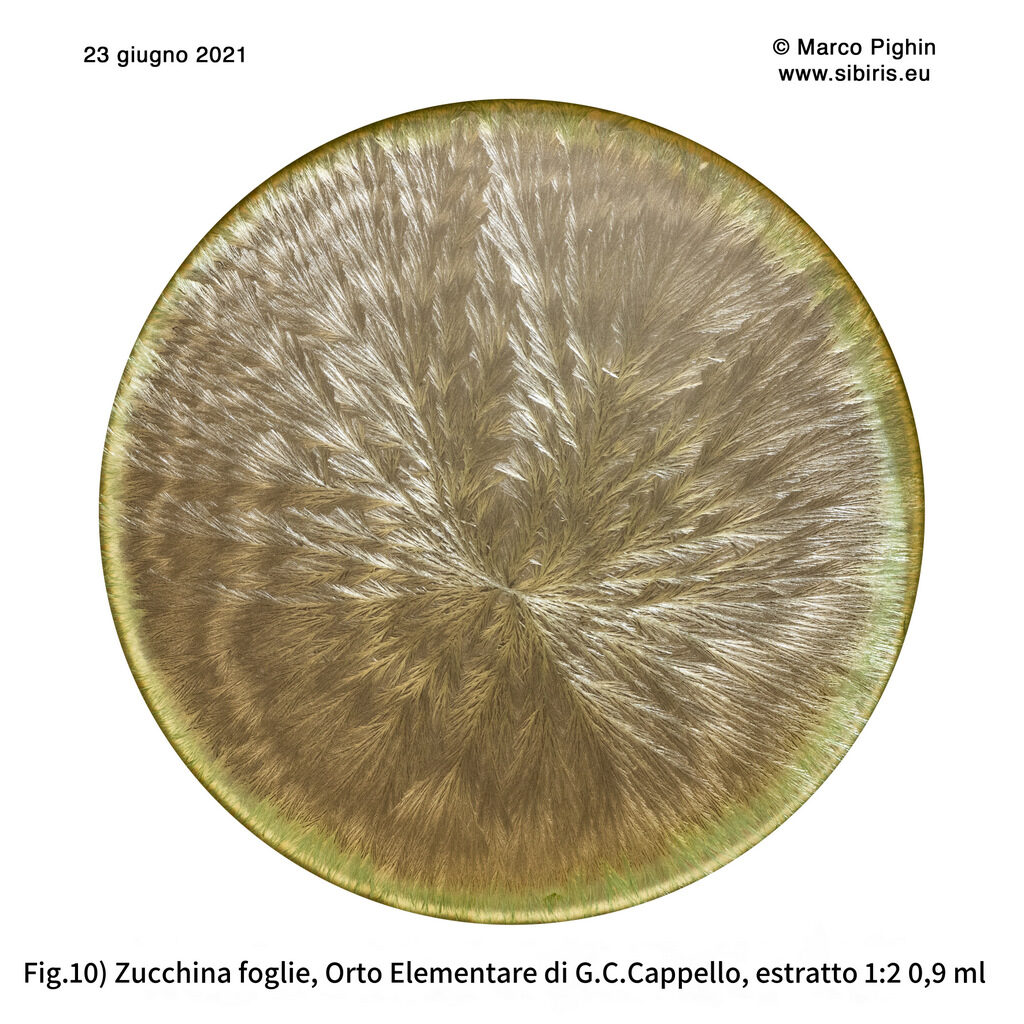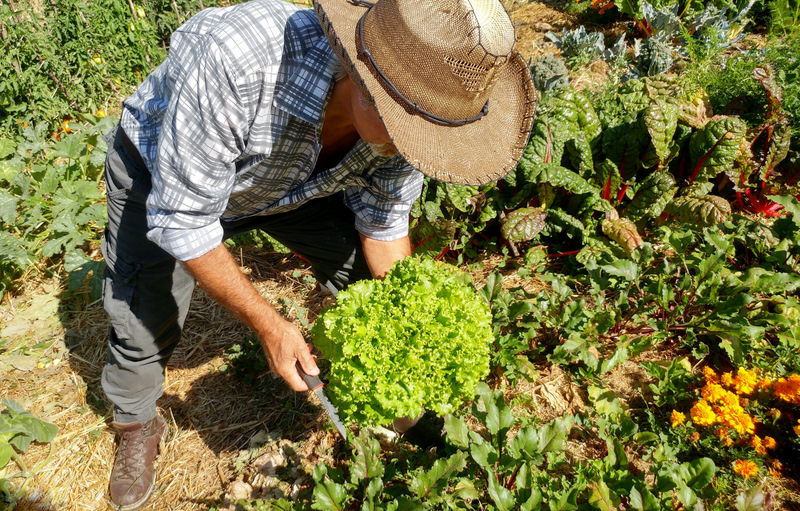"The difficulties (in cultivation) arise from trying to follow someone else's directions, obeying rules instead of using one's own common sense." ("Gardening Without Work," Ruth Stout, 1884-1980, The Devin-Adair Company, 1961; Italian translation: "L'Orto Senza Fatica" edited by Gian Carlo Cappello, 2021).
"The true purpose of agriculture is not to grow crops, but to cultivate and perfect human beings" ("Shizen noho wara ippon no kakumei," Masanobu Fukuoka, 1913-2008, Hakujusha, 1975; Italian translation: "La rivoluzione del Filo di Paglia," L.E.F., 1984).
What went wrong at some point in human history that led to the need to depart from the perfect and inscrutable laws of Nature and replace them with approximate, too human, scientific ones?
Etymologically, the word "agronomymeans "law, regulation of the field." It would have been nice if the reference to law and rules had been to those of Nature rather than science, but that's not the case. Since its etymological origin, agronomy is the scientific discipline that studies, regulates, and makes human intervention in the fields applicable, in spite of the laws of the food-producing Nature. It's the result of a roughly distorted humanism that places Man as a detached entity from Nature at the center of its attention. In my opinion, agronomy should instead be a non-scientific discipline, but a humanistic one in the noble sense of the term, perhaps the noblest of all; it should stimulate in us the desire to interpenetrate without interfering not only in the "Nature of things" but also... in the things of Nature, paraphrasing Publius Virgilius Maro, the first inspirer of humanists to come. This is the wise humanism that we receive pushed to the extreme boundaries of the human dimension as spiritual heirs of Francesco Petrarca Pater Patriae.
On the contrary, the noetic, reductionist, and materialistic science imposed by Power for its dominance and profit interests is not true knowledgeit's not theelevated spiritual level of which we are capable. Only by leaving agronomy behind can cultivated lands rise from today's desolate horizon, where we can recognize our true and natural soul.
Nowadays, the most effective weapon we have against the brutalization of Life desired by the oppressor is no longer the sword, but a full-range individual awareness that can become collective. Niccolò Machiavelli brings back in "De Principatibus" (1532), a powerful pamphlet where the King is finally naked, verses by Petrarca that are more relevant than ever, still capable of awakening in readers a choral dignity:
Vertù contra furore (Virtue against fury)
prenderà l’arme, et fia ‘l combatter corto: (shall take up arms, and the battle will be short:)
ché l’antiquo valore (cause the ancient valour)
ne gli italici cor’ non è anchor morto. (in Italian hearts is not yet dead.)
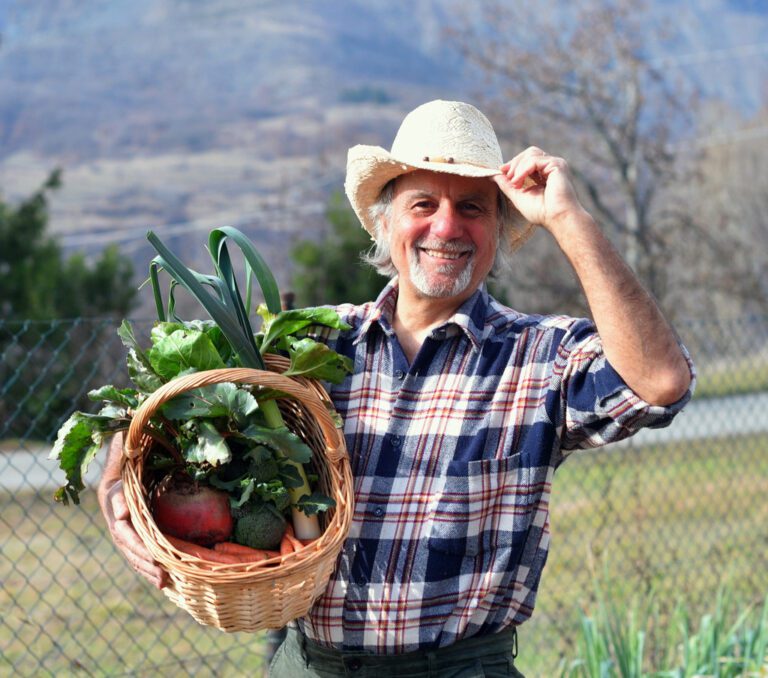
As a freelance agrotechnician, for decades I consulted agronomy manuals, ministerial decrees, scientific publications from research centers (including a two-year experience from 1980 as a researcher in the chemical fertilizers sector of AssorENI), but looking around, I saw cultivations subject to continuous phytosanitary treatments, scandalous irrigation regimes, increasingly heavy weed control, genetic modifications, all of this just so that monoculture crops could forcibly reach the end of their life cycle. In fact, if you place a seed in worked soil, there is no hope it can germinate, grow, and bear fruit without continuous inputs of water and fertilizers, which will make the plant grow according to different parameters from those of natural growth; an apparently lush plant, but weak and defenseless against life forms that will be considered pathogens to be fought with poisonous substances. Instead, those who benefit from soil alteration are pioneering weeds, strong and wild, which will have to be countered with powerful herbicides.
I still see titanic agricultural machinery devastating fields today, mechanical devices whose purchase and maintenance costs are made possible only by injecting "public" funds into the business cycle, where "public" means that the money taken from us by the State through taxes unscathed the pockets of politicians and ends up in the offshore bank accounts of industrialists producing machinery and agricultural chemicals. Monstrous machinery whose cost not only burdens our wallets but is also unloaded onto the environment, solely to control the prices of industrial agriculture products, leading to low-quality food responsible for the weakness and illnesses of consumers.
Agronomy provides agriculture with the scientific and technological means to cultivate plants that are hospitalized, from which we can expect poor food quality. Moreover, this production is in quantities far beyond actual needs, and the excess is then destroyed at our expense and that of the environment to maintain control over market prices. By financing this devastation, the state, in the hands of politicians, repays us for paying taxes into its coffers battered by corruption.
Reddite ergo quae sunt Caesaris Caesari (Therefore, give to Caesar what belongs to Caesar),
but let's save our body and soul from the Capital's parasitic system.
This is the context in which the goals of agronomy are situated, which makes us understand the results it has demonstrated to achieve. Just as the misleading role of advertisers is to convince consumers of the good quality of industrial agricultural products, the role of agricultural technicians is to convince farmers that there is no other possibility outside the compromise: polluting to produce. Agronomy teaches how to destroy soils with tilling and the addition of intolerable substances and at the same time indicates how to make them productive again using the same practices. Schizophrenia, a field of expertise more for psychologists than for a repentant agrotechnician like me.
Presenting them as established facts to be ratified, the laws derived from the reception of agricultural science statements impose codes of behavior that are actually arbitrary, contrary to our interests, and favorable to the powerful entities that inspire them. Here is an example of the weapons deployed by the political-economic power: in the Official Gazette published on October 21, 1999, we find a Ministerial Decree titled "Approval of Official Methods for Soil Chemical Analysis." The purpose of this decree is to unify the methods of soil sampling and analysis throughout Italy, in order to standardize procedures according to the indications of the "Technical Scientific Committee for the National Soil Observatory and Soil Quality." This is due to the environmental conferences held in the years prior in various parts of the world. Therefore, the standardize procedures according to the indications of the "Technical Scientific Committee for the National Soil Observatory and Soil Quality." This is due to the environmental conferences held in the years prior in various parts of the world. Therefore, the standardization desired by agro-industrial lobbies is formalized by Italy with this decree, but the intention is common to the governments of all the countries convened in the sparse halls of Rio de Janeiro (1992) and Cork (1996).
The purpose of the soil analyses described in the Ministerial Decree is to verify any mineral deficiencies in the soil according to standard tables, based on which the action to be taken to bring the soils to the considered optimal state must be decided, which is also defined there as... fertility. Translated into simple terms, if calcium is lacking, we will have to buy it from producing industries and spread it using specific machinery also of their production, in such a quantity as to reach the level considered necessary for plant growth. And this applies to the integration of all other components of agricultural soil that are identified as deficient in the analysis according to standard data. Themisunderstanding underlying these dictates is taking for granted that fertility is the mere sum of the percentages of minerals in the soil. In reality fertility cannot exist without vital energy. Our bodies are also composed of minerals, but they are also composed of death: what adds creativity and dynamism, what we recognize as the essence, is the energy called Life. Soil analyses detect the presence of minerals and organic residues, but not ofhumus the receptacle, guardian, and dispenser of the vital energy that animates itself and matter.

My view is thathumus is the place where energy and means are generated and preserved to disaggregate dead organic matter and minerals and reaggregate them into living organic form: the place hidden from our eyes by Nature, designated for the resurrection of Life..
Even though this description of humus is highly simplified and concise, it already transcends its materiality and diverges by choice from the statements of agronomic science, expanding its scope.
In my library, I have two copies of the agronomy bible: the "Agronomist's Handbook," first published in Italy in 1941 as a compendium of previous agricultural experiences. One of my copies is well-worn because it dates back to 1976 (the 5th edition, 3,237 pages), purchased in the last year of agricultural school. The other is a more current version, published in 2018 (the 6th edition, where the total number of pages is no longer mentioned, instead being divided into sections and subsections). I wanted to purchase this latest copy—despite its significant cost—just to understand what changes have occurred in official agronomic science over this half-century.
Apart from references to new agricultural technologies that have emerged in the meantime and, to appear politically correct, a few nods to environmental themes, conceptually the substance of the text remains unchanged. In the 1976 edition, the pages dedicated to humus are only three (it is not mentioned elsewhere in the text), and the description is reductionist and materialistic, consistent with the treatment of all other topics in the Handbook. In the 2018 edition—which is more massive in size despite the use of the same thin paper and roughly the same font size—amidst a sea of technicalities, I find only seven pages generally dedicated to soil microbiology, and behold, the word "humus" no longer appears. It's as if the word "Jahvè" were expunged from the Bible, a word found 6,000 times in the text. The only surreal explanation I can give for such blasphemy is that since humus is no longer present in agricultural fields, it might have seemed pointless for the experts and specialists who compile the "Handbook" to waste time discussing it. In this brief writing about agronomy, I mention it about twenty times.
Theinscrutable balance of Nature, always the same yet in constant dynamic transformation, has allowed for the utmost abundance of life in all its expressions for hundreds of millions of years, without humans sticking their fingers in it, fully involving them in the primordial appearance on the stage of that all-encompassing harmony. Agricultural science, however, applies to a static and repetitive model alien to Nature, reducing that perfect complexity in dynamic flux flux to a few arid data, with the result of leaving behind a land and humanity just as arid. The depletion of agricultural soils is evident to cultivators, and the state of apprehension it generates drives them to submit to the control of saving agronomy, in a circularity of cause-effect and self-induced work that we must absolutely interrupt by introducing a new agriculture freed from agronomy.
I am often asked, "Should I analyze my soil to provide what the analyses reveal as lacking?" My response to this question is a clear no. In fact, the very act of feeling the need to entrust the knowledge of the fertility of one's field to chemical-physical laboratory investigations puts the cultivator in a state of apprehension that places them at the discretion of experts, specialists, marginalizing them from understanding the natural reality, and inducing them to act contrary to what is wisely indicated by the philosophy of "non-doing." In this philosophy, the few things to "do" are only indicated by our true innate wisdom, which arises from the active contemplation of Nature, inherent in living beings uncorrupted by science and liberated from it—such as animals and trees, our exemplary companions on this Earth illuminated by the Sun and made fertile by humus.
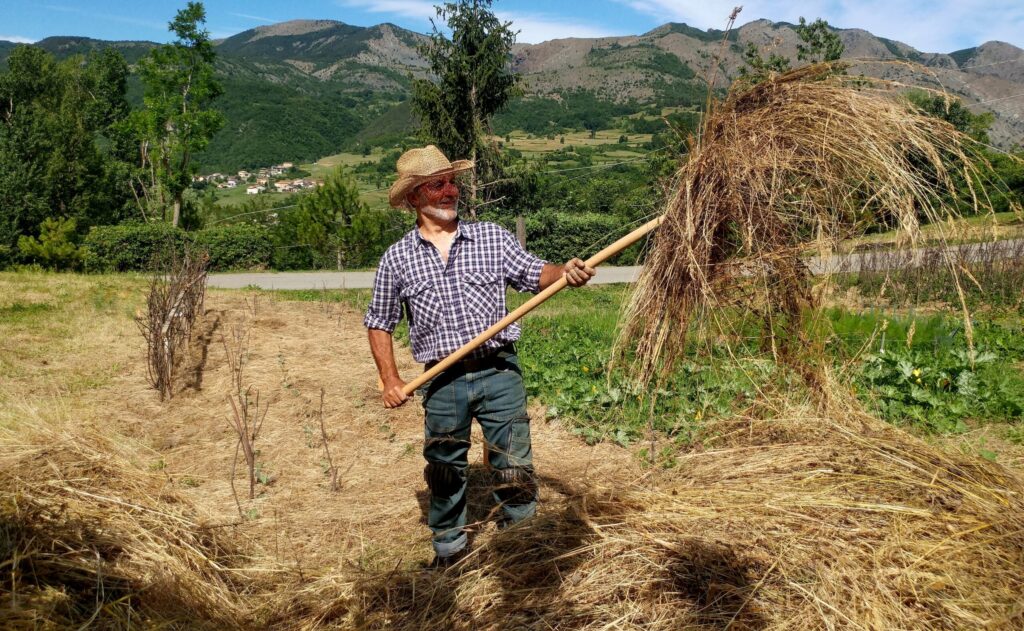
To those who ask me if I consider myself radical and extreme, my answer is indeed yes: I delve into the roots of problems without making concessions to anyone and carry my thoughts to their extreme consequences, because for me, this is is true love for the truth..
The roots of deficiencies inherent in agronomic science can be traced back to prehistory, presumably the Neolithic, quando col consolidarsi dell’agricoltura e dell’allevamento i nostri antenati sancirono la devianza umana intraprendendo il cammino del predominio sulla Natura, che coincise e si configurò con l’avvio della distruzione dell’humus. Secondo gli studiosi, in questo nuovo contesto evolutivo si svilupparono contemporaneamente il pensiero razionale, la proprietà privata patriarcale, i clan familiari, l’appropriazione ereditaria della terra non più bene comune (sorgente di una conflittualità sfociata nella regola storica della guerra continua), il condizionamento culturale del parto volto ad ottenere individui aggressivi, funzionali alla nuova mentalità di possesso. Per sopravvivere in un sistema cosiffatto la nostra stessa genetica si è conformata generazione dopo generazione alla necessità individuale di dominare o di sottomettersi socialmente.
Immagino che la possibilità di alterare la Natura in termini agricolo-pastorali possa aver rappresentato agli occhi dei nostri antenati la comodità dell’approvvigionamento di cibo “sotto casa” a fronte dei disagi della transumanza frugivora e dell’aleatorietà della caccia. L’agricoltura ci affrancava dalla vita nomade, l’allevamento ci dispensava dal cimentarsi nella caccia di animali più forti e veloci di noi, tanto da veder spesso rovesciati i ruoli. La soluzione fu sostituire la vegetazione spontanea con piante coltivate e costruire recinti nei quali tenere a portata di machete la carne. E qui sarà utile ricordare come la parola “capitalism”, da abbinare inevitabilmente a questa civiltà fondata sull’appropriazione privata del bene comune, abbia origine dal caput pecoris, il capo di bestiame della pastorizia e degli allevamenti. Avremmo potuto scegliere una strada differente, ma in mancanza dell’attuale consapevolezza non credo si sia trattato di una scelta quanto piuttosto di una, oggi discutibile, strategia di sopravvivenza nella quale siamo scivolati dentro, inedita in quel panorama ancora naturale.
A differenza degli altri animali, arginati nello sviluppo delle colonie dai fattori naturali di contenimento demografico, nell’essere umano l’accrescimento sempre maggiore della razionalità, stimolata dallo stress della difesa delle proprietà accaparrate dai più forti, crudeli e determinati ha portato al crescente detachment from the laws of nature sino ad affrancarsi del tutto dai limiti della proliferazione a scapito della limitatezza delle risorse ambientali.
In my opinion, there's a strong correlation between what we were at our beginnings—when the earth was rich in humusand what we have become today after the millennia-long destruction of humus initiated with agriculture. Since the basic survival strategy became consolidated with the progressive dominance of the human race over the environment, the level of of conflict with nature has gradually increased, reaching even the stars (in the sense that according to agronomists, we will soon be cultivating on Mars). In the millennia following the origins of agriculture, our our destructive actions were slow due to the limited means available. However, with the emergence of Roman-era agricultural-military technological research, there was a rapid increase in environmental destruction, altering the slow flow of agricultural life, much like a sudden void accelerates water into a waterfall. The creation of most deserts, which had begun slowly millennia before in Mesopotamia, occurred over a few centuries from then and continues to this day with exponential progression. This moment of accelerating destruction corresponds to thethe systematic organization of agronomic sciences, forcing agriculture into the gears of abstract laws.
Since Roman times tecnologia militare e quella agricola sono diventate indistinguibili, scambievoli e procedono tuttora di pari passo: dai carri armati ai trattori, dalla nitroglicerina ai nitrati, dal napalm ai diserbanti, dalla guerra biologica agli Organismi Geneticamente Modificati (OGM), dalle reti di comunicazione militare all’automazione eterodiretta delle attività agricole “di precisione”, solo per fare alcuni esempi. La definizione “precision agricultural technology," so popular today, is, in my opinion, more suitable for a bolt factory than for a place dedicated to life, which is, or should be, a cultivated field that provides us with our daily bread.
In the collective imagination, the positive perception of cultivated landscapes, such as the bare earth of plowed fields or vast wheat fields as far as the eye can see, is the product of the same culture that allows us to see positive aspects in war or in the top-down imposition on our lives.
By disturbing the natural humus layer, we initiated humanity's degeneration. Agronomy is responsible for providing agriculture with scientific crutches that exacerbate the rupture of our relationship with Mother Nature. For this reason, it must accept its share of responsibility in the holocaust of all the broken human lives over the past millennia due to famines and diseases. It's also responsible for the equally painful extermination of billions of farmed animals, the eradication of wild creatures, and the felling or burning of trees to make space for agriculture, first family-based, then landlord-driven, and now industrial.
If we, like every living being, are children of the humus that generates new life from what dies, then plunging the blade of a plow or shovel into the ground is like thrusting it into our own bodies. The fruit of that disemboweled land will be born dead and will kill something within us instead of enhancing our strength, just as the land's strength has been annihilated. Administering poisons in the field is like poisoning ourselves. The genetic alterations induced in GMOs will inevitably induce alterations in our own genome. The underground living beings killed by plowing, the animals slaughtered in factory farms, the military and civilian human casualties caused by the consequences of capitalist agriculture demand a new Nuremberg. On the stand: agronomy, the science that, by interfering with naturalhumus formation processes to the point of annihilating them, causes extensive environmental repercussions, dragging with it for centuries—all the way from ruined fields to which it is applied—every aspect of the planet's life.
I implore newly graduated and eager young agronomists to abandon any intention of technical-scientific control over natural processes, and instead, focus their passionate attention on the alignment, even in agriculture, between their deepest feeling and the pulsating life around them. An important warning, especially for the young, is not to fall into "biological" and "alternative" reformism, which is permeated with technologies, fertilizers, pesticides (sanctioned as "health aids"), "green" herbicides, "soft tilling," "Green Economy," landscape engineering, and other similar trivialities that fundamentally change nothing. The current situation does not allow us to postpone the choice of a cultivation that moves in the opposite direction to intervention, no matter how it's dressed up as "bio" or "green." For those involved in agriculture , it's time to be revolutionaries, not reformists..
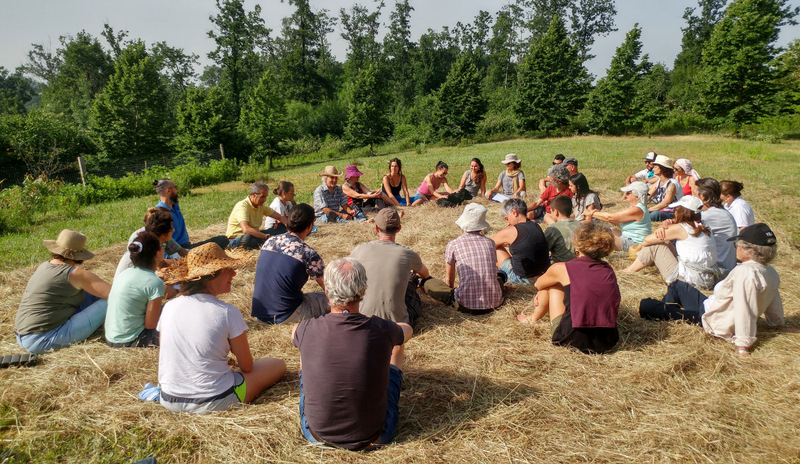
After the upheaval of Arcadia, under the control of an increasingly generalized, centralized, and pervasive Power, everything—not just the art of cultivation—has degenerated, manipulating our genuine basic needs. Taking care of oneself has turned into a pharmaceutical industry that generates diseases to "loyalize" us as client-patients. Learning has become an obligatory schooling to brand children's minds with the System's models. Empathic communication between living beings has become isolation caused by electronic devices. The usefulness and uniqueness of artisanal objects have become programmed obsolescence due to consumerism in anonymous serial industrial products. Love that creates families has become coercion subject to laws. Physiological childbirth has become a condition to be medicalized. Sensuality has been thrown into the abyss of pornography. Freedom of movement has become bottled up in automobile traffic. The protection we seek in housing has become preventive life imprisonment in anonymous buildings stacked on top of each other. The time outside of work is subject to agreements between unions and employers, and its quality depends on economic availability. Entertainment is no different from the grayness of daily life, and entertainment keeps you in front of a screen that spews advertisements and dictates conformist behaviors. Work, the noblest expression of individual creativity in service to the community, has become an obligation induced by mere survival. Our natural inclination towards transcendence has been reified in religious codes created by those who boast of their preferential relationship with the divine.
And so on, but all these are consequences of the attack launched onhumus by "agronomized" agriculture. Perhaps this is why agriculture, with all its scientific apparatus, is today referred to as the "primary sector" of this civilization so hostile to us—because it represents the primary attack on our humanity.
In the Terrestrial Paradise, there was no agriculture, and the punishment of becoming what we are now is a consequence of choosing a knowledge path that is no longer holistic, as we might say today, but rather stubbornly limited to apparent small immediate material advantages. Adam is the only mythological figure that, instead of being elevated to closer levels of divinity (in the presence of a tree, as often happens in mythological stories), has been demoted from semi-divinity to "by the sweat of your brow you will eat your food." who starts well...!
By alteringhumus , agriculture, the child of the sin of (know)ledge, has interrupted the cyclical and eternal exchange between mineral becoming life and life returning to mineral. And from here begins the ongoing annihilation of life itself on the planet and our condition as mortals, terrified by the awareness of our impending death.
The return to the original Terrestrial Paradise, akin to an ideal primitiveness in harmony with natural forces that elude our understanding and control, requires the overcoming of agronomic science in particular and science in general as they have been shaped today—a mixture of arrogance, philosophical superficiality, and economic interests contrary to us. Practices for which every generation of scientists and researchers studies and works to remedy the damage caused by the previous generation, only to discover remedies even worse for us but more profitable for the Establishment.
If it's true that in the dimension of Nature, we find our only reality, then science and what reason has become reveal themselves as pure alienation. Casting off agriculture and its science means reintegrating the divinity of Nature into our humanity, detached from the toil of life and the fear of death. Only in a new civilization different from the current one will there be nothing contrary to the realization of these assumptions.
The new agriculture consists precisely in transcending the practices studied by agronomy, thus nullifying agronomy itself.
The Elementary Farming centers on recognizing the central role of humus in the cycle of life.
For this reason, in Elementary Farming , the soil is never worked, not even superficially or at the beginning of cultivation. The soil profile is not altered through raised beds, terraces, or other shaping techniques. No fertilizers, pesticides, amendments, herbicides, or other chemical, organic, or homeopathic preparations are used. Crop rotation, cover cropping, intercropping, variety mixtures, composting, space planning, scheduling, irrigation systems, animals, and their derivatives, industrial technologies, machinery, dogmatic positions in the choice of seeds, old or new varieties, are not taken into consideration, favoring self-produced seeds. Even the use of GMOs is not considered. Recognition from the scientific world is deemed unnecessary, and soil analyses are not performed.
Here's what is done instead: the natural balance of the cultivation context is considered essential for the healthy growth of plants; living spontaneous grass among cultivated plants is valued; the garden is mulched with meadow hay throughout the year; planting and sowing are done in an organized manner, forming "Nests" or rows in the mulch, without mixing varieties; so-called "diseases" are seen as natural processes that help maintain healthy balance in cultivation; inner growth, learning, intuition, feeling, innate wisdom, creativity, foresight, common sense, self-discipline, and experience are promoted; individual, family, and community self-sufficiency are supported for overcoming capitalist economics (even if hidden behind other ideological facades).
The Elementary Farming , despite ignoring the dictates of agronomic sciences and their applications, yields reliable, abundant, healthy, tasty, and nutritious harvests. In conclusion, I believe that the true revolution to return to simply being human consists of giving humus the opportunity to recreate itself where it has been destroyed, avoiding the scientific and technological intrusion of agronomy into the Affairs of Nature.
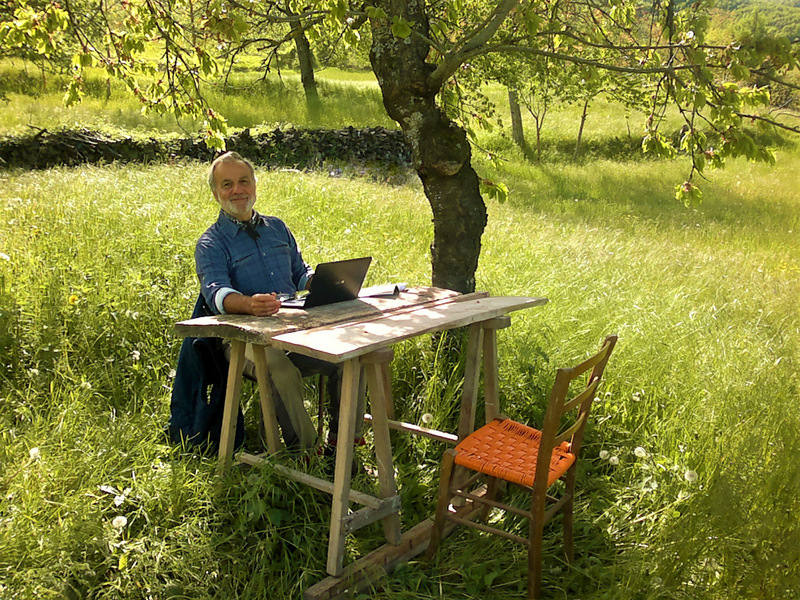
Text and photos by Gian Carlo Cappello and Mara Lilith Orlandi. © All rights reserved. Reproduction prohibited.

